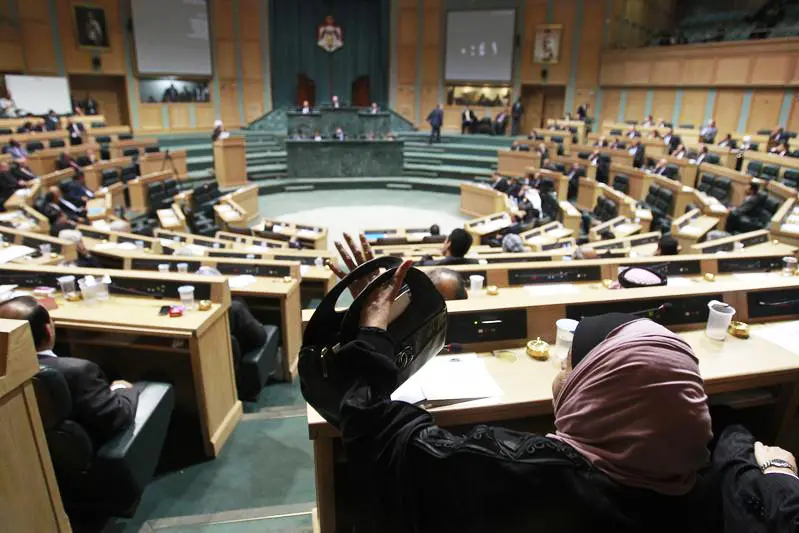PHOTO
* Islamists join with other parties for poll
* Muslim Brotherhood and political wing had faced a ban
* Election seen as step towards democratisation
(Adds Islamist grouping warns government against vote-rigging)
By Suleiman Al-Khalidi
AMMAN, Sept 20 (Reuters) - Jordan's moderate Islamist opposition could emerge from Tuesday's parliamentary election with renewed influence after surviving government attempts to ban it as part of a wider crackdown on political Islam, analysts said.
The group could win up to a fifth of seats in the parliament after ditching its "Islam is the Solution" slogan and joining with Christians and prominent national figures to create a broad-based civic grouping, The National Coalition for Reform, they added.
Officials said turnout was 36 percent of 4.1 million eligible voters at the end of polling, lower than the election in January 2013.
This appeared to confirm reports by independent observers who anticipated apathy from many voters with minimal confidence in a parliament dominated by pro-government tribal deputies.
Ballot counting went relatively smoothly with results expected on Wednesday. No major incidents were reported in tribal areas where clan fights can occur when results are released.
The Islamist-backed National Coalition for Reform said it was cautiously observing the ballot counting, warning of a repeat of irregularities and vote-rigging that Islamists had in past polls accused the authorities of conducting to foil their electoral gains.
"The recurrence of negative practices in previous elections could threaten the democratic future in Jordan," the grouping warned in a statement on Tuesday.
The election represents a modest step in the democratisation process launched by staunch U.S. ally King Abdullah as he seeks to insulate Jordan from the conflicts at its borders. But the vote is expected to show the resilience of Islamists in the face of heavy state restrictions, Western diplomats and analysts said.
Electoral laws that favour tribal areas rather than cities, where Islamists enjoy most support, mean they are unlikely to dominate the poll, but they could still shake up Jordan's staid political scene, analysts said.
"This will be an extension of previous parliaments created by successive governments. But ... the challenges we face require a brave stance," said Sheikh Hamza Mansour, a prominent Muslim Brotherhood figure.
Vilified by pro-government media, the Muslim Brotherhood and its political arm, the Islamic Action Front (IAF), had boycotted elections for a decade in protest at electoral laws they felt were biased against them, while pressing demands for broader political representation.
The Muslim Brotherhood has been allowed to operate in Jordan since 1946. But it came under suspicion after the Arab Spring, in which Islamists pitted against established powers in many Arab countries.
Jordan came close to banning the Brotherhood this year in what the Islamists have said was a settling of scores with them for instigating protests that focused on reforming the government and limiting King Abdullah's powers. The protests fell short of demanding the overthrow of the monarchy.
Elections are contested under an electoral law that left intact a voting system that favours sparsely populated tribal East Bank constituencies over the densely populated cities mostly inhabited by Jordanians of Palestinian descent, which are Islamic strongholds and highly politicised.
The political empowerment of Jordanians of Palestinian origin is a sensitive issue in a country with many citizens of Palestinian origin.
But the Islamists have commanded increasing support in rural and tribal areas in recent years.
The Islamic Action Front participated in this vote in part to get round legal moves to ban it and the Brotherhood for boycotting elections. Now, the election will test the front's grassroots support.
"The IAF's relative skill in organisation and messaging ... leaves it well placed to capture a significant number of seats in parliament," said the U.S.-based International Republican Institute, one of several international observers.
PASSIVE PARLIAMENT
The Islamists' boycott had long reduced Jordanian elections to a contest between tribal leaders, establishment figures and independent businessmen.
The Islamic Action Front has fielded candidates in a majority of electoral districts. It hopes to do well by aligning with independents who share an opposition agenda, shaking up a passive parliament packed with pro-government deputies.
That passivity has allowed successive governments to enact draconian temporary laws restricting public freedoms and to pass unpopular austerity measures urged by the International Monetary Fund, said Mansour.
Showcasing their attempts to unite with other groups for the election, Islamists campaigned with Awdeh Qawwas, a prominent priest, in the affluent Abdoun district of the capital Amman.
Crimson posters advertising the coalition have replaced the green Muslim Brotherhood flags, Koranic verses and slogans espousing jihad that were the hallmark of Jordan's Islamists.
"If there are real deputies whom our great people can elect, there will be a real parliament able to hold accountable anyone who lays his hand on public funds," said Mansour Murad, a leftist in the Islamist coalition.
The comeback of Jordan's best organised opposition has left secular rivals fearing the revival of Islamism in a contest where national politics has taken a back seat.
They have responded by demanding the separation of politics and religions and attacking political Islam.
"There should be no guardianship over people in the name of religion," said Kais Khalil Zayadin, a young lawyer running on the "Maan" (together) list, whose campaign has resonated in affluent areas of the capital.
UNDER-REPRESENTATION
For many Jordanians, the fact that elections are being held at all demonstrates their country's stability in a violent region.
"The mere fact we are holding elections and going to our homes safely and counting votes instead of counting the dead is a testimony to how Jordan's leadership has steered us away from destruction," said Bassam Haddadeen, a former member of parliament and minister.
Others see the election as unjust or meaningless, given rules that ensure Jordanian cities will be under-represented.
In one constituency in the impoverished city of Zarqa, 450,000 eligible voters who usually back Islamists have only six parliamentary seats. By contrast, in the southern tribal town of Maan, 59,000 voters choose four members of parliament.
More than two-thirds of Jordan's seven million people live in cities but are allocated less than a third of assembly seats.
Officials dismissed claims by some international observers that voters are growing apathetic, disillusioned by a parliament unable to challenge governments picked by the king.
"The parliament is the gateway to political reform, whether we like it or not. Jordan is on the path towards political reform. Some say we are moving slowly, others say we are moving fast, but it is going forward as it should," said Khaled Kaladeh, head of the government-run Independent Election Commission.
(Reporting by Suleiman Al-Khalidi; Editing by Angus McDowall, Giles Elgood, Janet Lawrence and Richard Chang) ((suleiman.al-khalidi@thomsonreuters.com; +962 79 5521407; Reuters Messaging: suleiman.al-khalidi.reuters.com@thomsonreuters.net))
* Muslim Brotherhood and political wing had faced a ban
* Election seen as step towards democratisation
(Adds Islamist grouping warns government against vote-rigging)
By Suleiman Al-Khalidi
AMMAN, Sept 20 (Reuters) - Jordan's moderate Islamist opposition could emerge from Tuesday's parliamentary election with renewed influence after surviving government attempts to ban it as part of a wider crackdown on political Islam, analysts said.
The group could win up to a fifth of seats in the parliament after ditching its "Islam is the Solution" slogan and joining with Christians and prominent national figures to create a broad-based civic grouping, The National Coalition for Reform, they added.
Officials said turnout was 36 percent of 4.1 million eligible voters at the end of polling, lower than the election in January 2013.
This appeared to confirm reports by independent observers who anticipated apathy from many voters with minimal confidence in a parliament dominated by pro-government tribal deputies.
Ballot counting went relatively smoothly with results expected on Wednesday. No major incidents were reported in tribal areas where clan fights can occur when results are released.
The Islamist-backed National Coalition for Reform said it was cautiously observing the ballot counting, warning of a repeat of irregularities and vote-rigging that Islamists had in past polls accused the authorities of conducting to foil their electoral gains.
"The recurrence of negative practices in previous elections could threaten the democratic future in Jordan," the grouping warned in a statement on Tuesday.
The election represents a modest step in the democratisation process launched by staunch U.S. ally King Abdullah as he seeks to insulate Jordan from the conflicts at its borders. But the vote is expected to show the resilience of Islamists in the face of heavy state restrictions, Western diplomats and analysts said.
Electoral laws that favour tribal areas rather than cities, where Islamists enjoy most support, mean they are unlikely to dominate the poll, but they could still shake up Jordan's staid political scene, analysts said.
"This will be an extension of previous parliaments created by successive governments. But ... the challenges we face require a brave stance," said Sheikh Hamza Mansour, a prominent Muslim Brotherhood figure.
Vilified by pro-government media, the Muslim Brotherhood and its political arm, the Islamic Action Front (IAF), had boycotted elections for a decade in protest at electoral laws they felt were biased against them, while pressing demands for broader political representation.
The Muslim Brotherhood has been allowed to operate in Jordan since 1946. But it came under suspicion after the Arab Spring, in which Islamists pitted against established powers in many Arab countries.
Jordan came close to banning the Brotherhood this year in what the Islamists have said was a settling of scores with them for instigating protests that focused on reforming the government and limiting King Abdullah's powers. The protests fell short of demanding the overthrow of the monarchy.
Elections are contested under an electoral law that left intact a voting system that favours sparsely populated tribal East Bank constituencies over the densely populated cities mostly inhabited by Jordanians of Palestinian descent, which are Islamic strongholds and highly politicised.
The political empowerment of Jordanians of Palestinian origin is a sensitive issue in a country with many citizens of Palestinian origin.
But the Islamists have commanded increasing support in rural and tribal areas in recent years.
The Islamic Action Front participated in this vote in part to get round legal moves to ban it and the Brotherhood for boycotting elections. Now, the election will test the front's grassroots support.
"The IAF's relative skill in organisation and messaging ... leaves it well placed to capture a significant number of seats in parliament," said the U.S.-based International Republican Institute, one of several international observers.
PASSIVE PARLIAMENT
The Islamists' boycott had long reduced Jordanian elections to a contest between tribal leaders, establishment figures and independent businessmen.
The Islamic Action Front has fielded candidates in a majority of electoral districts. It hopes to do well by aligning with independents who share an opposition agenda, shaking up a passive parliament packed with pro-government deputies.
That passivity has allowed successive governments to enact draconian temporary laws restricting public freedoms and to pass unpopular austerity measures urged by the International Monetary Fund, said Mansour.
Showcasing their attempts to unite with other groups for the election, Islamists campaigned with Awdeh Qawwas, a prominent priest, in the affluent Abdoun district of the capital Amman.
Crimson posters advertising the coalition have replaced the green Muslim Brotherhood flags, Koranic verses and slogans espousing jihad that were the hallmark of Jordan's Islamists.
"If there are real deputies whom our great people can elect, there will be a real parliament able to hold accountable anyone who lays his hand on public funds," said Mansour Murad, a leftist in the Islamist coalition.
The comeback of Jordan's best organised opposition has left secular rivals fearing the revival of Islamism in a contest where national politics has taken a back seat.
They have responded by demanding the separation of politics and religions and attacking political Islam.
"There should be no guardianship over people in the name of religion," said Kais Khalil Zayadin, a young lawyer running on the "Maan" (together) list, whose campaign has resonated in affluent areas of the capital.
UNDER-REPRESENTATION
For many Jordanians, the fact that elections are being held at all demonstrates their country's stability in a violent region.
"The mere fact we are holding elections and going to our homes safely and counting votes instead of counting the dead is a testimony to how Jordan's leadership has steered us away from destruction," said Bassam Haddadeen, a former member of parliament and minister.
Others see the election as unjust or meaningless, given rules that ensure Jordanian cities will be under-represented.
In one constituency in the impoverished city of Zarqa, 450,000 eligible voters who usually back Islamists have only six parliamentary seats. By contrast, in the southern tribal town of Maan, 59,000 voters choose four members of parliament.
More than two-thirds of Jordan's seven million people live in cities but are allocated less than a third of assembly seats.
Officials dismissed claims by some international observers that voters are growing apathetic, disillusioned by a parliament unable to challenge governments picked by the king.
"The parliament is the gateway to political reform, whether we like it or not. Jordan is on the path towards political reform. Some say we are moving slowly, others say we are moving fast, but it is going forward as it should," said Khaled Kaladeh, head of the government-run Independent Election Commission.
(Reporting by Suleiman Al-Khalidi; Editing by Angus McDowall, Giles Elgood, Janet Lawrence and Richard Chang) ((suleiman.al-khalidi@thomsonreuters.com; +962 79 5521407; Reuters Messaging: suleiman.al-khalidi.reuters.com@thomsonreuters.net))





















